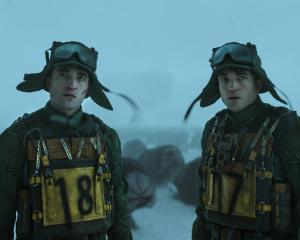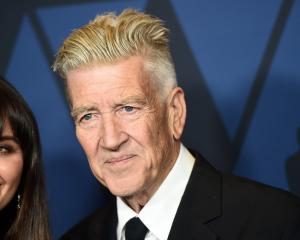
Any actor planning to play Genghis Khan in a big-screen film had better carry himself with more than just a hint of presence.
Historical records on the 12th-century Mongol warrior are sketchy, but there's enough evidence to suggest he possessed a pretty severe megalomaniacal streak, his armies marauding across vast tracts of Asia and the Middle East.
Screen presence has never been a problem for Japanese actor Tadanobu Asano.
His brooding good looks and athletic physique stand out in a country that seems to throw out a stream of pimply, skinny actors.
At 35, he has played more than his share of ready-to-pop-off weirdos and homicidal maniacs in a busy acting career that has made him one of the most sought-after actors in Japan's indie films.
Yet in the Oscar-nominated Mongol, a classical epic showered in geysers of blood, Asano portrays the future conqueror of Asia as a mumbling love-struck loner.
Although he eventually shows he can swing a sword like a baseball slugger, Asano's Khan spends most of his time trying simply to survive the cruelty of his enemies.
The greater days of scheming to unite the tribes of northeast Asia and mount invasions across the rest of the continent (what Genghis Khan's Wikipedia entry understatedly calls "an aggressive foreign policy") lie ahead.
"People probably have an image of him as a strong man who showed his emotion and power," says Asano, now shorn of the long, lank hair that gives his Khan a Christ-like ghostliness.
"I didn't know much about him at all, but when I read the script, I saw him as a deep thinker, a quiet type who didn't waste energy and always knew where he wanted to go."
Asano's portrayal has received widespread critical praise, as has the movie, which picked up an Oscar nomination for best foreign language film.
Directed by Russia's Sergei Bodrov, Mongol suggests a Genghis Khan reluctantly drawn to a life of battle.
His Rosebud was the beautiful Borte, a girl from a neighbouring tribe whom he spotted during a wife-hunting tour with his dad as a 9-year-old and who became his soul mate.
They are connected even when enslaved by others. For her, he musters armies and goes to war.
Bodrov sought out Asano for the role, and the Japanese actor prepared for it not only by learning to speak his lines phonetically in Mongolian but also by learning how to ride a horse.
"Mongolians are a tough people," Asano says.
"Even now they ride, they hunt. They have an instinct to fight. Mongolians have much more of a wild sense than Japanese people. We are used to easy living in big cities."
No-one can accuse Asano of coasting.
He has acted professionally since winning his first TV role at 14, a move he admits was originally motivated largely by his family's need for money.
His movie count now runs to 46, and he has directed a couple more.
Music is a competing love: He's married to a musician, still plays drums and bass in rock bands, and does some DJing in Tokyo techno clubs. He paints. He designs clothing.
"No-one gets rich in the Japanese movie industry," says his father and lifelong manager, Yukihisa Sato, who says his son has movie roles booked for the next year and a-half.
"You have to take every role that's offered."
Still, there are some who say Asano hasn't had to extend himself in his film work for a while.
"He has a natural talent, so there are people who say he's blessed by the movie gods," his father says.
Sato blames complacency for Asano's failure to land a part in Clint Eastwood's Letters From Iwo Jima.
"He didn't want it badly enough," his father says of his son's audition.
"He's found it so easy to be successful for so long that maybe he wasn't able to show enough enthusiasm."
Asano says Iwo Jima wasn't his kind of film and isn't heartbroken about having missed it.
But he does not deny that his career was in need of fresh challenges when Bodrov called about the lead in Mongol.
He expresses frustration with the formulaic handcuffs of the Japanese entertainment industry, which is controlled by massive talent agencies exercising a degree of career control over their star system that would make Louis B. Mayer blush.
The agencies develop the stars from a young age, slotting them into TV roles and pop idol bands that fit with each star's cookie-cutter image.
"Our artists are not good at expressing themselves," Asano says.
"Ever since grade school we have been taught to all behave the same way. It's comfortable; you're pretty much protected in that world.
"But to be successful, you have to be different. And I was lucky that my father and my mother encouraged me to be my own person."
Asano says he would take a good Hollywood role if it was offered, though he declares that "right now, no-one recognises me in Hollywood."
The US intrigues him.
His maternal grandfather was a Navajo from Kentucky who met his grandmother while serving in the US military in Japan.
He abandoned the family, returning to the US, where he died.
But Asano also sees great opportunities in the rest of Asia, where there is money to make movies and so many stories to tell.
Mongol was a pan-Asian movie-making exercise: a Japanese leading man, a Russian director and a cast of Mongolians and Chinese supported by buckets of money from Kazakhstan's government film agency.
"Asians have started to feel more like comrades," Asano says.
"National borders haven't disappeared. But there are many young people in the field who want to work with other good people wherever they are from."
He finds the prospect energising.
"I want to work on movies that I can appreciate," Asano says.
"I didn't always think that way. I wasn't always confident in myself. But I've changed. I found that what I had done was not enough.
"Mongol is the movie that made me think, made me realise that I want to do great movies," he says.
"I've now become greedy."












